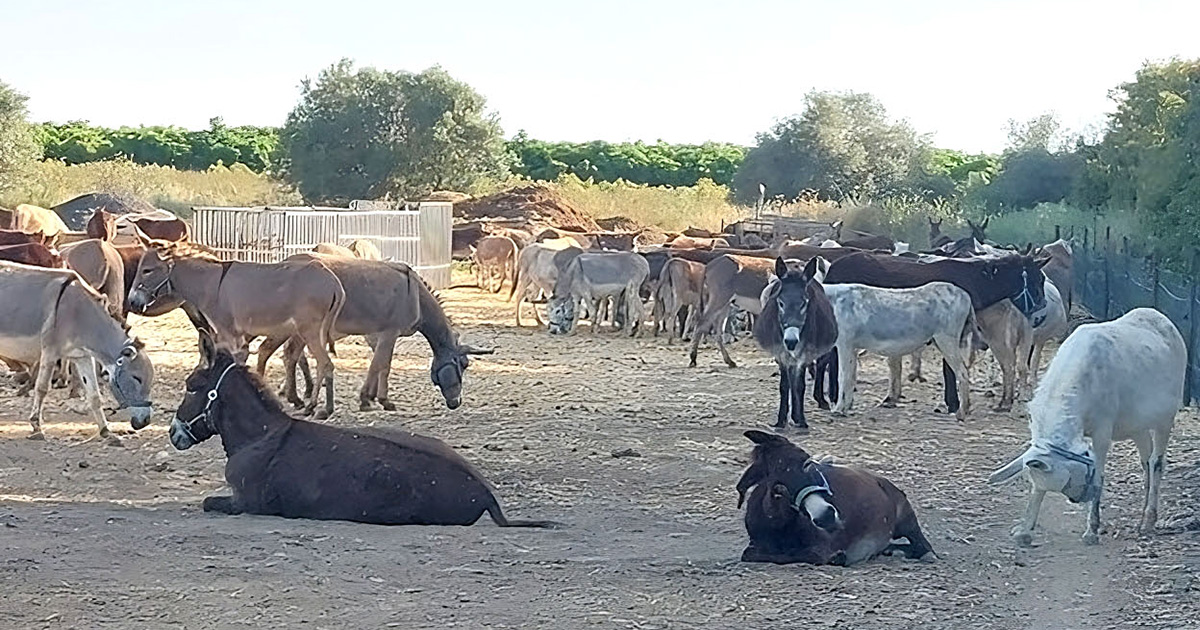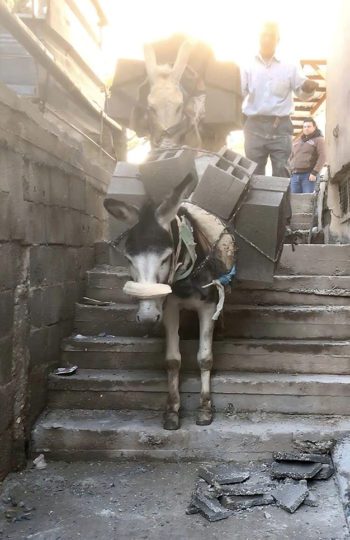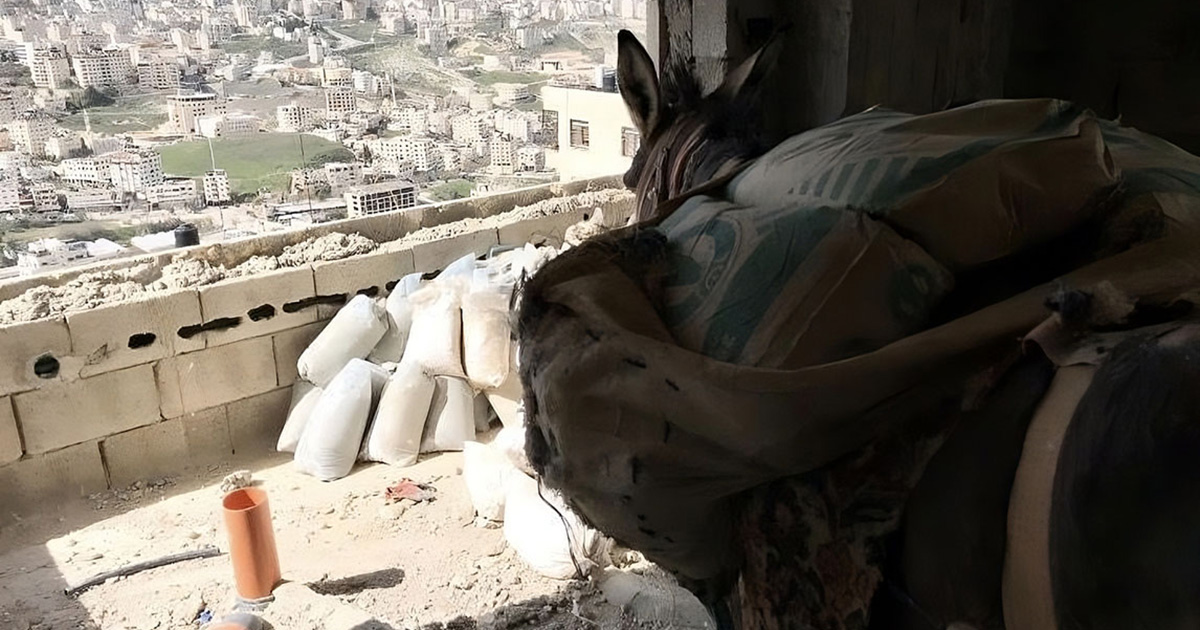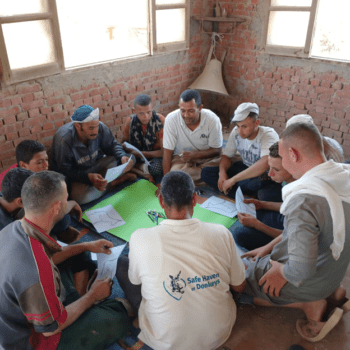14 Nov 2023
Anna Harrison explains the lengths one charity goes to regarding improving these animals’ lives in such a turbulent environment.

Image © aninna / Adobe Stock
Safe Haven for Donkeys – a small, UK-registered charity with an annual income of around £1.3 million – works across one of the most turbulent areas in the world. Just three full-time equivalent members of staff in the UK are dedicated to raising funds and awareness.
In common with several other animal charities (for example, SPANA, Brooke and The Donkey Sanctuary) it was conceived by a woman.
At its inception in 2000, Safe Haven for Donkeys rescued neglected and abandoned donkeys in Israel, and a small sanctuary was created around 15km inland from the coastal town of Netanya and close to the border with the West Bank. Be it ever so humble, it did the job of offering sanctuary to donkeys in desperate need.
Working equids are now increasingly rare in Israel, where mechanisation has overtaken donkey power, although a resurgence of donkey-drawn carriage rides provided for tourists in the Negev Desert has emerged.
Around 180 donkeys are currently in residence, ranging from 6 months to 38 years of age. A no-breeding policy exists, with all stallions being castrated before joining the herd, but rescued pregnant mares result in a foal from time to time. Many of the donkeys are of Palestinian origin, having been rescued when no border restrictions existed on equids crossing into Israel (sadly, these movements are currently not allowed).
These donkeys live in a relatively natural habitat. It is warm to frankly hot for much of the year and very dry. Grass is a rarity. The recommendation for donkeys in the UK is that a pair require approximately an acre of ground, together with adequate year-round shelter.
At Safe Haven for Donkeys, the herd has access to approximately three acres, with adequate year-round shelter. That is not a typo. Even on a meagre three acres, much unused space always seems to exist as the donkeys naturally herd together (Figure 1).

They live a grass-free life, with the terrain being basically sandy. Their diet comprises ad lib straw. The straw is chopped for those donkeys with compromised dentition.
Browse, in the form of branches from an adjacent avocado plantation, is offered regularly to satisfy a behavioural need and provide enrichment (and, yes, much exists in the literature about toxicity of many elements of the avocado tree in the form of persin, but this herd has had access to the browse for more than 20 years, with no apparent ill effects).

The great majority of the donkeys are in ideal body condition (body condition score 2.5 to 3). Cases of laminitis are extremely rare and no case of PPID or EMS has been diagnosed. This is a welcome change from the constant challenges faced by UK owners whose donkeys usually have access to too much grass despite track systems and restricted grazing time, and their donkeys suffer the consequences, with obesity and laminitis being commonly recognised.
The author has not seen any lice infestations in the herd. The dry environment at Safe Haven results in generally good hoof health, with hoof abscesses and white line disease being rare. The abrasive substrate means farriery is only required about three times a year. Faecal worm egg counts are rarely above 200 eggs per gram – perhaps because the environment is hostile to the viability of eggs and larvae.
A local equine veterinarian carries out a weekly herd health visit, which includes dental examinations and treatments, and is on hand at other times for emergencies. The herd is vaccinated against rabies and tetanus. This is an ageing herd and regular quality of life assessments are carried out. No religious or cultural barrier to euthanasia exists in Israel.
The staff comprise three Arabic farm workers who work in close harmony with the Jewish visitor guide and social media manager, and the Jewish attending veterinarian. It is a lesson for us all that working together can trump cultural and religious differences.
However, the charity soon realised the need for veterinary care for the many working donkeys in the occupied Palestinian territory (the West Bank) where, in the absence of mechanisation, there is almost total reliance on donkeys and mules in the construction industry, as well as on farms.
Here, the donkey is multi-talented – the white van; the crane; the load carrier; the mount. The donkey is solely responsible for carrying loads of bricks and sand up the steps of buildings under construction essential for the creation of further levels, resulting in a high-rise property (Figure 2). As the buildings get taller, so the job becomes harder, with more flights of steps to negotiate (Figure 3).

Chain nosebands are the norm, such that donkeys are controlled by pain and suffer deep wounds on what is a very sensitive area of the face (Figures 4 and 5). Other harness and saddle wounds are also common (Figure 6).
Unwanted donkeys that may be ill, injured or just worn out are simply abandoned in the frenetically busy streets of large towns such as Nablus and Jenin. While a veterinary school exists in the West Bank, no formal training relating to donkeys exists and donkey owners are reluctant or unable to pay private veterinary fees.
The donkey is its own worst enemy, with owners failing to spot the subtle behavioural signs of pain. Horses are generally prized, whereas donkeys are certainly not, even though they provide the very lifeline for their owners – and all this in an area of constant political turmoil and conflict.
Safe Haven for Donkeys employs a vet and farrier team in each of three locations – Nablus, Hebron and the Jordan Valley – carrying out vital outreach work in local villages, construction sites and animal markets.
The senior vet, Dr Salous, also has a small clinic adjacent to the busy animal market in Nablus. The clinic doubles as a mini sanctuary, currently housing 30 donkeys – all of whom have been rescued from dire situations. Here, Dr Rakan can see patients and encourage good practice regarding ongoing care.
The small property provides basic, safe accommodation for the donkeys, but Safe Haven for Donkeys has worked hard to find a more suitable site near the town of Jenin where the donkeys will be afforded a lot more turnout space. Education is key and all three vets make every outreach visit a learning experience for equine owners. Dr Rakan hosts vet students who have the opportunity for a unique EMS experience with him.
Most welfare issues arise from ignorance and a culture of non-care for donkeys. It is heartening that, over the years, Dr Rakan has reported that he is seeing better welfare as a result of the work of Safe Haven for Donkeys. Sadly, in common with just about everywhere, acts of extreme and deliberate cruelty still exist.
One example is an aged stallion whose ear was reportedly doused in accelerant and set alight (Figure 7). This donkey was found wandering the streets of Jericho in a poor body condition and with a severely injured ear. Dr Rakan arranged transport to his clinic and commenced immediate supportive treatment, but with euthanasia as an option if the donkey did not show signs of improvement.
Once the donkey was stabilised, Dr Rakan performed an auriculectomy under general anaesthesia as nerve blocks were not proving completely effective. This donkey started behaving more normally soon after surgery and was castrated once considered fit. He will spend the rest of his days in safety and the company of other donkeys under the care of Safe Haven (Figure 8). And that was it, until…
With the withdrawal of a large UK equine charity, the donkeys and mules enduring life in the brick kilns at El Saf were left with no veterinary support whatsoever. Life here is tough for animals and humans – blistering desert heat, donkeys and mules pulling extremely heavy loads of sun-dried bricks to the even hotter kilns for firing.
It is common for children to take on the role of donkey handler despite having no training. Beating and harness wounds are common (Figure 9), as are corneal ulcers, lameness, chronic hoof deformities through long-term abnormal loading, dental disease, colic and poor body condition. Forage is not readily available, with all the equids being fed a type of local grain.

Safe Haven for Donkeys is now funding an experienced equine vet, farrier and educational specialist to work across 150 tightly grouped, individually owned brick kilns in the Al Giza desert some 80km south of Cairo to help these animals (approximately 3,000) in desperate need.
Apart from day-to-day treatments, education is very much at the forefront of this new project and workshops have already started to help donkey users realise the importance of good welfare (Figure 10).
Furthermore, government vets, vet students and farriers will be included in training sessions to learn more about the unique features of the donkey from a professional point of view. This project is in its infancy, but is already achieving evidence-based positive results.
At the time of writing, Israel is at war with Gaza and there is increased unrest in the West Bank. Safe Haven for Donkeys continues its work. This small, but highly effective, charity does not do religion and it does not do politics, but it does do donkeys and it does them really well.
Having worked for two of the largest animal welfare charities in the UK, it is refreshing to be involved with an organisation that does not have enough income to waste, nor time for in-house politics.
Please visit www.safehaven4donkeys.org or find it on social media.